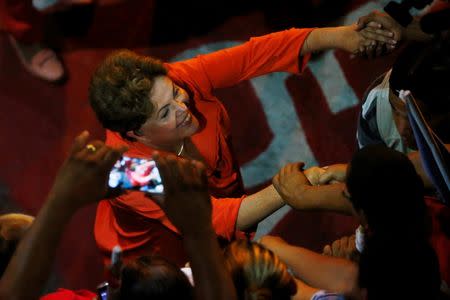Campaign donations highlight winners, losers in Brazil election
By Silvio Cascione and Brad Haynes BRASILIA/SAO PAULO (Reuters) - Brazil's financial markets have rallied on the prospect of environmentalist Marina Silva unseating President Dilma Rousseff in next month's election, but political donations show plenty of companies may be wary of a new administration. Silva's market-friendly proposals promise relief for oil giant Petrobras, ethanol mills and private banks. But they could also cause headaches for a range of firms facing tougher competition, higher borrowing costs and maybe even more taxes, especially in the energy and auto industries. Political fundraising reflects the split among potential winners and losers, with the vast majority of donations going to the incumbent - a reflection of powerful business interests comfortable with the status quo that Rousseff represents. The money pouring into Brazil's stock market has gone in the opposite direction, driving up shares of companies that would benefit from a Silva presidency and lifting the Bovespa index as much as 11 percent when she first surged in polls. "Right now in the investor community we're focused on just getting Dilma Rousseff out of office, but once Silva is in power it's a different ball game," said Aryam Vazquez, a senior economist with the Oxford Economics investment consulting firm. Rousseff has drawn the most campaign donations from construction and agribusiness firms such as builder OAS and meatpacker JBS. Big names in the finance and ethanol industries such as Santander Brasil and Copersucar have thrown their support behind Silva, according to campaign finance data published this month by Brazil's electoral court. Rousseff and the national committees of her Workers' Party have collected more than 185 million reais ($79 million), or about two thirds of political donations to the top three presidential candidates. Silva's Brazilian Socialist Party (PSB) has collected over 34 million reais at the national level. Aecio Neves, the candidate favored by many investors, has raised more than 71 million reais, mostly before Silva's surge in polls. But he is running in distant third place and is unlikely to make a runoff vote. Most observers believe Silva will reduce the fundraising gap as polls show her neck-and-neck with Rousseff in a likely runoff vote. But Rousseff's incumbent advantage will be hard to beat among oil and gas suppliers, food and drink producers and the big construction groups profiting from government-sponsored infrastructure projects. Developers and engineering companies have donated more than 130 million reais to Brazil's main presidential candidates, or about 45 percent of all fundraising, and they have steered two of every three reais to Rousseff. The Odebrecht construction group has donated 4 million reais to the incumbent, about four times its contributions to Silva's campaign. Other builders were even more aggressive, such as OAS, giving over 30 million reais to Rousseff, nearly six times its backing for Silva. Companies are allowed to donate up to 2 percent of revenues to election campaigns, although several major graft scandals in recent years have revealed undisclosed funding of illegal political slush funds. BETTING ON CHANGE Rousseff's incumbent advantage breaks down in some sectors. Among ethanol producers, for example, donations have been evenly split between Rousseff and Silva, due to a hefty donation of 1.75 million reais from Brazil's biggest sugar and ethanol trader, Copersucar, to the environmentalist's campaign. Copersucar has not donated to Rousseff. The ethanol industry is betting Silva would let gas prices rise and make good on a pledge to restore a gas tax wiped out by Rousseff, thereby increasing the appeal of cheaper biofuels. "Taxation of polluting fossil fuels opens room for renewable fuels, which reduces emissions," said Elizabeth Farina, president of sugar and ethanol industry group Unica. "Given the environmental benefits, it absolutely makes sense as part of Marina Silva's platform." Shares of sugar and ethanol group São Martinho SA have gained about 15 percent in a month as a strong Silva candidacy raised hopes of higher gas prices. The current fuel pricing policy has also saddled state-run oil company Petrobras with deep losses and mounting debts, and Silva's surge in the polls drove up Petrobras shares as much as 30 percent. The stock has shed about half those gains as polls showed the race tightening. But for domestic suppliers of Petrobras such as oil services company Lupatech and steelmaker Usiminas, a Silva government could loosen their hold on a captive market. Her advisers criticize a policy pushing oil companies to buy offshore platforms with an average of two thirds national content, which some blame for driving up Petrobras' costs and slowing its investments. "Promoting local content is key to the Brazilian industry, but it needs to take into account a gradual path of growth. You cannot assign such a task to the national industry if it is still unable to deliver," Walter Feldman, Silva's campaign coordinator, told Reuters. Global oil and gas suppliers from General Electric to Siemens have invested heavily in Brazilian factories to give them access to local contracts. Several local companies have thrived because of the requirement. "We like the national content program. It's allowed us to build up our business and we will become more competitive over time," said Arnaldo Calbucci, a vice president for Brazilian shipbuilder and leaser Wilson Sons. BALANCING THE BUDGET Brazil faces tough choices on economic policy no matter who wins the election. The next president will need to restore fiscal discipline and reignite economic growth to avoid another downgrade from credit rating agencies. But Silva's plans to cut spending, roll back subsidized credit for big companies and lower barriers to foreign competition suggest a faster economic adjustment that could hurt some companies benefiting from cheap loans and trade protections under Rousseff's leftist government. "Corporate Brazil knows the depth of the reforms needed, but it will be a painful adjustment without a doubt," said Vazquez of Oxford Economics. Silva promises renewed fiscal discipline and her advisers have talked about the need to slash up to 100 billion reais in spending. However, analysts say commitments to poverty relief programs could force a new administration to raise revenue by rolling back recent tax breaks. Economists led by former central bank director Mario Mesquita at Banco Brasil Plural said a Silva administration would probably restore the fuel tax and increase an industrial tax on cars and furniture. Both measures would add about 20 billion reais in revenue next year, according to their calculations. At a campaign event this month, Rousseff decried political rivals for "balancing their books on the backs of the people." "We won't let that happen. That's why we don't support higher gas prices and we don't support higher taxes," she said. Rising taxes could hurt car sales in one of the world's top five auto markets. Global carmakers from Volkswagen to Ford are already suffering from a slowdown in the Brazilian market, along with local auto part makers such as Iochpe-Maxion and Autometal. Silva's most prominent economic adviser, Eduardo Giannetti, also criticizes current industrial policy for the dramatic expansion of subsidized loans from state development bank BNDES to many of Brazil's biggest companies. Giannetti has said that industry should prepare to be "weaned" off the current policy, which he blamed for distorting credit markets and fueling inflation. He did not give details of how Silva would make such an adjustment, adding that there were no plans for a sudden, "traumatic" shock to credit markets. INTEREST RATE SENSITIVITY Still, a small interest rate increase may be in the cards. Some analysts warn against raising the benchmark rate for BNDES operations, known as the TJLP, as it could hurt much-needed investment in infrastructure and deepen the current recession. But other economists such as Morgan Stanley's Arthur Carvalho see a TJLP hike next year, which could reduce the drag on government accounts and help control inflation. Companies as diverse as power generator Eneva, electronics retailer B2W and truck maker Randon would be among the biggest losers on Brazil's stock market if the TJLP rate goes up, according to Morgan Stanley. The bank's economists forecast earnings would drop by 11 percent on average for every 100 basis points the rate rose. Many unlisted companies would also be hurt, such as big builders Odebrecht, Andrade Gutierrez and Camargo Correa. Scaling back BNDES lending could open room for non-government banks to pick up the slack. An opposition victory would also end years of tense, often hostile, relations between the Rousseff government and private banks. An index of Brazilian lenders such as Itau Unibanco has climbed about 10 percent since Silva's surge in the polls. Banco Santander, which irked Rousseff by circulating a client note saying her re-election would be bad for local asset prices, donated 1.1 million reais to Silva's PSB party and nothing to Rousseff so far. That donation, like many others to the PSB, came before the death of the party's first presidential candidate Eduardo Campos in a plane crash last month. Silva, who was his running mate, was thrust to the top of the ticket after his death. Even as a vice-presidential candidate, Silva had an outsized role in designing the PSB platform with Campos, and much of the support he built with some businesses has transferred to her candidacy, which has turned the election race on its head. "I'm not declaring my vote, but Marina's election as president of Brazil would be a natural evolution," Roberto Setubal, chief executive of Itau Unibanco, told about 1,000 business leaders at the bank's anniversary concert this month. (Additional reporting by Jeb Blount and Marta Nogueira in Rio de Janeiro; Editing by Todd Benson and Kieran Murray)

 Yahoo News
Yahoo News 



